BBC's live coverage moves to a new pagepublished at 05:07 GMT 5 November 2023
For technical reasons, we are now moving our coverage to a new page.
- Click here for the latest updates and continued live coverage.
Arab countries demand an immediate ceasefire in Gaza, but the US warns this would allow Hamas to regroup
US Secretary of State Antony Blinken has met leaders from Lebanon, Qatar and Jordan in Amman - as he pushes for humanitarian pauses in the fighting
But Israeli PM Benjamin Netanyahu said on Friday there will be no temporary ceasefire with Hamas in Gaza until all Israeli hostages are released
Earlier, a US envoy said 350,000-400,000 people remain in northern Gaza, which Israel has warned civilians to leave
The Israeli military is also carrying out strikes in the south and the UN says no part of Gaza is safe
Israel began bombing Gaza after Hamas killed more than 1,400 people in Israel and kidnapped more than 200 others
The Hamas-run health ministry in Gaza says more than 9,400 people have been killed in the Strip since 7 October
Edited by Michael Sheils McNamee and Nathan Williams
For technical reasons, we are now moving our coverage to a new page.
 Nathan Williams
Nathan Williams
Live reporter
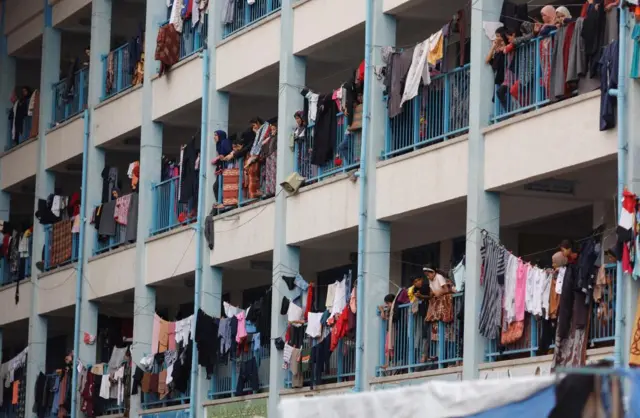 Image source, Reuters
Image source, ReutersThe UN warns that its facilities housing displaced Gazans are becoming overcrowded
We're pausing our live coverage for the next few hours, so until then here's where things stand in the war between Israel and Hamas in Gaza.
The US Secretary of State Antony Blinken is heading to Turkey on Sunday, as he continues his diplomatic push.
He's been working with leaders in the region on a so-called humanitarian pause in the fighting, and we heard from President Joe Biden on Saturday who suggested there had been some progress on the issues.
Arab countries have been demanding an immediate ceasefire, but the US is worried that this would allow Hamas to regroup.
Meanwhile, Israeli forces are pushing deeper and deeper into Gaza City. Israel said the main road south from Gaza City would be open for three hours on Saturday to let anyone wanting to leave. But the army accused Hamas of trying to stop people from leaving .
We've had an update from the UN on the humanitarian situation in Gaza. It says there are nearly 1.5 million displaced in the territory, with more than 700,000 sheltering in UN facilities. It warns that these are becoming overcrowded - adding to health risks for the population – and its sites in the south of the territory are now over capacity
There have been problems at the Rafah crossing into Egypt - the only way out of Gaza - with reports saying that foreign nationals were not being allowed to leave the territory. Hamas was reportedly asking for more wounded people to leave before more foreigners could leave.
There's been an update on the humanitarian situation in Gaza from the UN office for the coordination of humanitarian affairs. Here are some its key points:
Antony Blinken will visit Turkey on Sunday, according to the US State Department, where he will remain until Monday afternoon.
It is not yet clear who the US Secretary of State will be meeting.
Last week Turkey's president, Recep Tayyip Erdogan, called Hamas a "liberation" group and accused Israel of behaving like a "war criminal".
Israel responded by ordering its diplomats in Turkey to return.
The Palestinian Red Crescent Society says it is providing psychological first aid , externalto medical teams in Gaza.
The organisation also said recreational activities were being provided at the Al-Quds Hospital to ease their psychological strain.
Rushdi Abualouf
Reporting from Khan Younis, southern Gaza
According to local Hamas authorities, hundreds of thousands of people are still in the area of Israeli military operations in Gaza City and the cities and villages of the north, where the humanitarian situation is getting worse due to cuts in water, electricity and internet services.
Suhier Al Louh, a mother of seven in the north, told the BBC: "We drink unclean water. We eat one meal every day - mainly canned tuna or canned beans.
"Sometimes I cook some lentils on an old wood-burning stove. We have solar panels on the roof so we can charge our phones."
The focus of Israeli forces still seems to be the Al-Shifa Hospital, which is located in the western part of Gaza City and is metres away from the Palestinian Legislative Council, in which Hamas won the majority of seats in the 2006 elections.
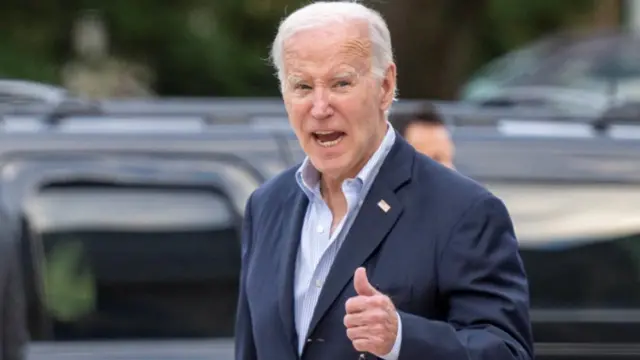 Image source, Reuters
Image source, ReutersUS President Joe Biden gives a thumbs-up in response to a question about progress on a "humanitarian pause"
US President Joe Biden says that there has been some progress made on securing a so-called "humanitarian pause" in the fighting.
His secretary of state, Antony Blinken has been working on the same issue, as he continues his diplomacy in the region.
Asked if any progress had been made on the issue, Biden replied "yes" and offered a thumbs up, without giving any further details.
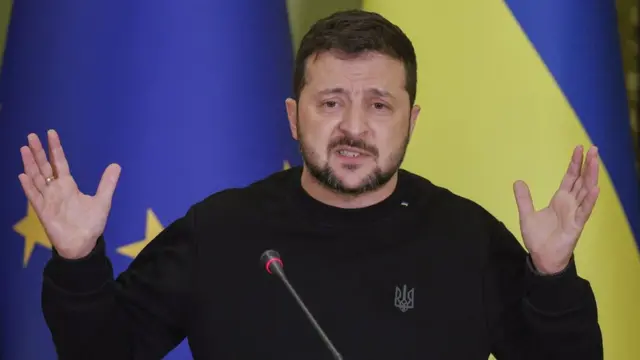 Image source, EPA-EFE/REX/Shutterstock
Image source, EPA-EFE/REX/ShutterstockThe Israel-Gaza war is "taking away the focus" from the conflict in Ukraine, the country's President Volodymyr Zelensky has admitted.
He said this was "one of the goals" of Russia, which launched a full-scale invasion of Ukraine in February 2022.
And he denied that fighting in Ukraine had reached a stalemate, despite a recent assessment to this effect by the country's top military general.
Ukraine's counter-offensive in the south has so far made little headway, prompting fears of war fatigue among Kyiv's Western allies.
You can read more about what President Zelensky had to say here.
Turkey has recalled its ambassador to Israel following the country's refusal to agree to a ceasefire in its conflict with Hamas.
Turkey's foreign ministry stated that the withdrawal was the result of the "unfolding humanitarian tragedy in Gaza caused by the continuing attacks by Israel against civilians, and Israel's refusal [to accept] a ceasefire".
In 2022, Sakir Ozkan Torunlar became Turkey's first ambassador to Israel in four years after the country withdrew its former ambassador in protest of the killing of dozens of Palestinians in 2018.
The move reflects an emerging tension between the two countries, with Tukey's President Recep Tayyip Erdogan saying earlier that his government will cut off communication with Israeli Prime Minister Benjamin Netanyahu.
"Netanyahu is no longer someone we can talk to. We have written him off," Turkish media quoted Erdogan as saying.
 Paul Adams
Paul Adams
Diplomatic correspondent
We told you earlier that US special envoy David Satterfield had said that when the fuel runs out in Gaza, there is "an agreed mechanism" to bring more in.
“We have every expectation that in an appropriate manner fuel will be brought in,” he told reporters in Amman.
Israel has not allowed any fuel shipments to enter the Strip since the war began on 7 October, and has also cut off electricity supply - prompting calls from UN agencies for fuel supplies into Gaza to power basic services.
Now there are reports that Israel has informed the US about a contingency plan to get fuel in once hospitals start to run out.
The American news website Axios, quoting unnamed Israeli officials, says fuel tankers will be accompanied by a UN team which will monitor the shipment and ensure that it’s delivered correctly.
In his remarks to reporters, Mr Satterfield said that an agreement between the US, Israel and the UN has kept hospitals, trucks and desalination plants supplied with existing fuel stocks for the past week. But he emphasised that no fuel had yet come in from outside.
The UK Foreign Office has confirmed that British citizens in Gaza have been unable to leave via the Rafah crossing into Egypt.
We reported this morning that there were 112 entries under "UK" on the list of people allowed to evacuate Gaza through the crossing on Saturday, including 88 British citizens.
But a spokesperson for the Foreign, Commonwealth and Development Office has now told the BBC: "We are disappointed that the Rafah crossing has been temporarily closed today.
"This continues to be a complex and challenging situation and we are using all diplomatic channels to press for its reopening in coordination with our international partners."
Our BBC Arabic colleagues reported earlier that no foreign nationals, dual nationals or injured patients had crossed over into Egypt from Gaza via Rafah today.
It appears Hamas wants Egypt to admit more wounded people before letting foreigners leave.
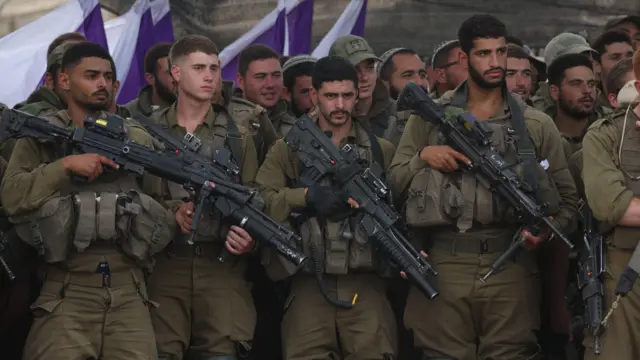 Image source, Shutterstock
Image source, ShutterstockIsraeli soldiers standing in formation while being addressed by the defence minister
Israeli Defence Minister Yoav Gallant has listed the top Hamas targets of the Israeli Defense Forces (IDF) and vowed to "find and eliminate" them.
Yahya Sinwar is the head of Hamas in Gaza and a top military priority for the Israeli forces.
"I tell the residents of Gaza - if you reach him before us, it will shorten the war," said the defence minister.
The leader of Hamas' armed wing, Mohammed Deif, is another one of the army's top targets and security sources say that Sinwar and Deif are now somewhere in the network of tunnels below Gaza.
Speaking at a news conference, Gallant said that the IDF had completed the encircling of Gaza City and had "entered populated areas", operating from the south and the north.
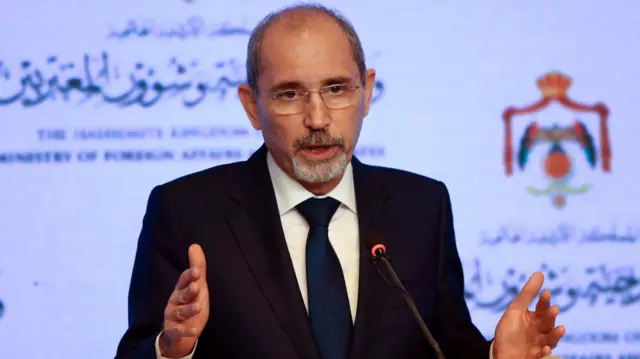 Image source, EPA
Image source, EPAJordan's Foreign Minister Ayman Safadi has called for all sides to work together to "stop a catastrophe that will haunt the region for generations".
He made the call during his joint news conference in Amman with US Secretary of State Antony Blinken and Egyptian Foreign Minister Sameh Shoukry.
He said: "I think we need to remind each other of our humanity. I think we need to accept that killing more people will not bring [back] those who are lost on both sides, as tragic as the loss is.
"I think we need to all emphasise that everything we can do to save one more life is imperative upon all of us."
He added: "As human beings, we just cannot accept to see all that killing unfolding, to see all that reduction of life...How can we justify to anybody that killing 9,000 people, killing 3,700 children, destroying 150,000 houses, destroying hospitals - how can we justify that this is self-defence?"
Safadi warned that the war "is going to push us all again into the abyss of hatred and dehumanisation that will make killing even more acceptable. That needs to stop."
A Liverpool surgeon has said he felt a "big, big relief" when he was reunited with his family in the UK after fleeing Gaza.
Dr Abdelkader Hammad, who has spent the past 10 years visiting the area to undertake kidney transplants and train local doctors, said he also felt "guilty" after escaping from the war-torn region. He added that he could "smell death" there as many bodies were still under the rubble.
On arriving at Heathrow, nearly a month after war began on 7 October, he said: "It has been four weeks waiting for this moment really to happen, and, I mean at some stage I wasn't sure this would happen, really… but thank God, I am here."
A doctor says he felt a "big relief" on arriving at Heathrow after fleeing the war-torn region.
Read MoreProtesters are expected to gather in major Israeli cities this evening in support of the families of hostages held by Hamas in Gaza.
Demonstrations are scheduled to take place in several towns and cities, including Haifa, Tel Aviv, Jerusalem, Be'er Sheva and Eilat, according to Haaretz newspaper.
Four weeks on from the 7 October attack on Israel, Hamas is still holding 241 people hostage, including children, grandparents and other civilians as well as soldiers.
Prime Minister Benjamin Netanyahu has told US Secretary of State, Antony Blinken, that there would be no pause in Israel's strikes against Gaza - to allow humanitarian aid into the territory - without the return of the hostages.
Some of the protesters are expected to call for the removal of Netanyahu from his position, says Haaretz.
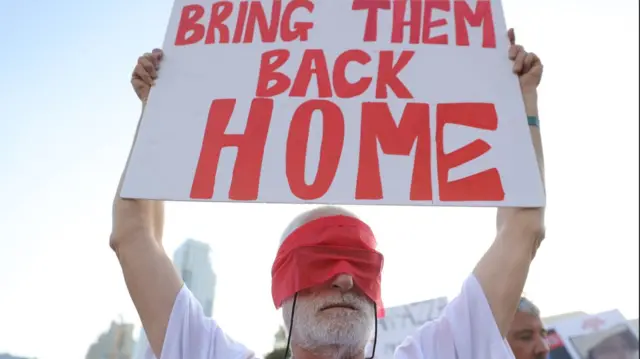 Image source, EPA
Image source, EPASaturday's protests will follow demonstrations in Tel Aviv earlier this week
Rushdi Abualouf
Gaza City
It seems that the Israeli military operation has a clear target: to enter the western and eastern parts of the Gaza Strip and squeeze the civilian populations into the central neighbourhoods of Sabra, Ziton, Daraj and Askoula.
There are five areas in which fighting is taking place - and that fighting is described on both sides of the conflict as fierce.
The most prominent is in the north west, where dozens of tanks and armoured vehicles have penetrated Gaza from Israel along the coast and travelled six to seven kilometres into Gaza.
They then moved eastwards in an apparent attempt to isolate Gaza City, the largest city in the Strip in size and population.
There, Israeli military aircraft have intensified their air strikes around the al-Quds hospital, which currently houses thousands of displaced people who fled to its courtyards for safety.
Many people here see these strikes as aimed at pushing civilians to move again, further to the south and away from Gaza City.
The Palestinian Red Crescent Society said that one such strike near the hospital today injured 21 people.
Footage seen by the BBC showed the huge scale of destruction to buildings and roads around the hospital..
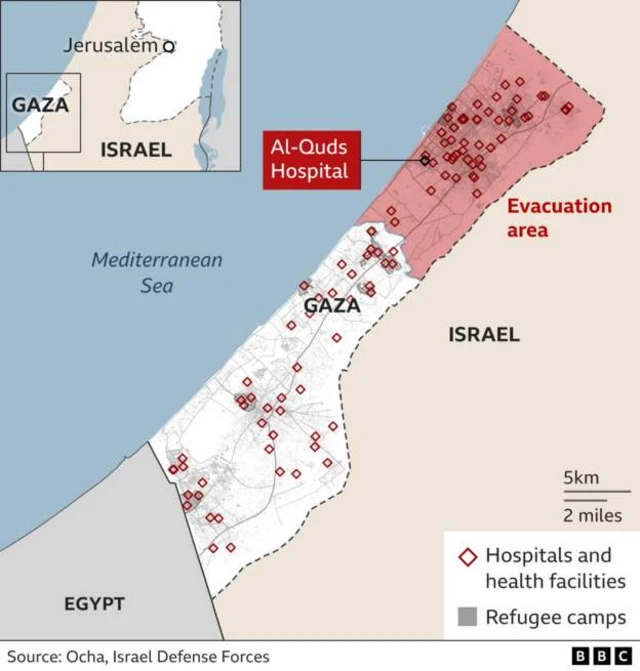
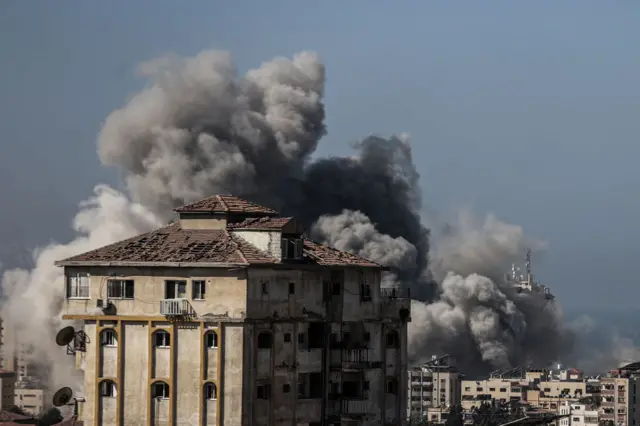 Image source, Getty Images
Image source, Getty ImagesSmoke rises after an Israeli attack as the attacks continue on the 29th day in Gaza City
It is just past 19:00 in Israel and Gaza - and 17:00 in our London newsroom.
With the diplomatic discussions winding down in Jordan's capital, Amman, here's a broader look at the biggest developments from today.
Blinken's visit to Amman:
In northern Gaza:
And further south:
 Paul Adams
Paul Adams
Reporting from Jerusalem
On the face of it, US and Arab officials have very different views on what’s needed first in Gaza.
The Jordanian and Egyptian foreign ministers both said an immediate ceasefire was vital.
But US Secretary of State Antony Blinken said that would leave Hamas in place, able to regroup and attack Israel again.
The US administration shares Israel’s desire to remove Hamas once and for all, and sees its role at the moment as trying to influence the way Israel conducts its campaign - currently focused mainly in the north - while addressing the urgent need to improve humanitarian conditions in the south.
Jordan and Egypt would prefer to see an end to Hamas too, but the Arab world is appalled by scenes of dreadful Palestinian suffering and just wants the killing to stop.
Jordan's Ayman Safadi also spoke eloquently about his fears for the future of Gaza.
Would Israel’s military campaign leave a wasteland in its wake, with an entire population reduced to the status of refugees?
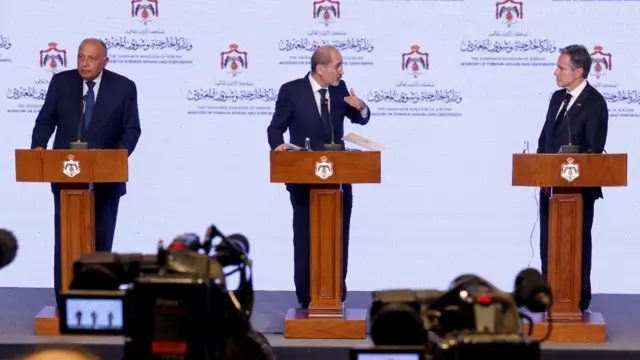 Image source, Reuters
Image source, ReutersWe've just heard from US Secretary of State Antony Blinken, Jordanian Foreign Minister Ayman Safadi and Egyptian Foreign Minister Sameh Shoukry at a joint press conference. These were the key moments:
Safadi
Blinken
Shoukry
One journalist asked Blinken what Israel has achieved in its operation, apart from "killing nearly 10,000 people".
Speaking about the attacks on 7 October, he said "not a single one of the countries represented here" or "pretty much any country in the world would simply accept the slaughter of its citizens and do nothing about it".
But he again stressed the need to take measures to protect civilians and said that in conversations with the Israeli government "we have pointed to steps that they could and should take to minimise harm to civilians".
However, he says that this "is also an extraordinary challenge" as Hamas "cynically, monstrously embeds itself in the midst of civilians" with fighters, weapons and command and control placed in and underneath schools, hospitals, mosques and residential buildings.
The press conference has now ended - stay with us and we'll recap the key lines and bring you more updates and analysis.